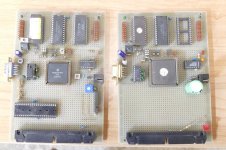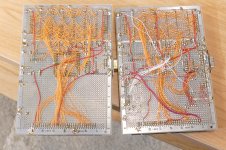For at least the last 10 years, Intel CPUs have had a mini-CPU running inside of them which uses the minix operating system. Its operations, code, and communication is inaccessible to the user. No scans or audits of the system at software level can detect it.
The IT industry and privacy experts have speculated on the purpose of this hidden computer inside your computer.
After its existence was discovered, Intel claimed it was for the "intel management engine" which allows remote management of the system - an ability that already existed through the operating system or other third party hardware/software combinations.
I would ask - if its purpose was good, then why would the engineers have concealed its existence, and why has Intel given the reason as a redundant feature?
I believe (and this is personal opinion) that this tech monitors what you type on your keyboard in order to assemble password databases. Also, what programs you launch, and what web addresses you put into web browsers. It may look for keywords such as "patent" or "confidential" when loading editing or saving documents. It may be used for law enforcement surveillance. It may also go as far as to watch your economic activity either to gain statistical information on stock market moves, or identify individuals or companies purchasing contraband, or engaging in political dissent.
The fact of the matter is that a device now exists in tens of millions of computers all around the world that can read, edit, write, and communicate any and all information on the machine to parties unknown.
The IT industry and privacy experts have speculated on the purpose of this hidden computer inside your computer.
After its existence was discovered, Intel claimed it was for the "intel management engine" which allows remote management of the system - an ability that already existed through the operating system or other third party hardware/software combinations.
I would ask - if its purpose was good, then why would the engineers have concealed its existence, and why has Intel given the reason as a redundant feature?
I believe (and this is personal opinion) that this tech monitors what you type on your keyboard in order to assemble password databases. Also, what programs you launch, and what web addresses you put into web browsers. It may look for keywords such as "patent" or "confidential" when loading editing or saving documents. It may be used for law enforcement surveillance. It may also go as far as to watch your economic activity either to gain statistical information on stock market moves, or identify individuals or companies purchasing contraband, or engaging in political dissent.
The fact of the matter is that a device now exists in tens of millions of computers all around the world that can read, edit, write, and communicate any and all information on the machine to parties unknown.
I absolutely detest Siri, and I have no Amazon Alexa either. I have an iPhone SE two, with no random apps on it, no candy crush or other BS.I'm suspect that phones are always listening. Battery life would be awful, and mine lasts for 2 days iff I don't use it. I think more likely you have a siri or whatever google calls their assistance box on you counter. Now those do listen all the time regardless of the claims.
I’ve used a spectrum analyzer and observed my phone in its off state still sending burst transmissions. Battery life wouldn’t be that affected, it’s easy to save a low quality file and send it in a burst transmission as soon as your phone is activated again. Or not. Or maybe I’m on some list.
The point is, these days, if you choose to use technology, the technology is also using you.
A cell phone needs to be in constant contact with the network for handover and network management protocol to work correctly. A modern cell site receiver will be listening to several transmitters operating on the same frequency simultaneously. Each phone transmitter has its signal distinguished from all of the others on the same frequency by a unique spreading code, time slot, or other method. The cell site receiver picks up these transmissions, downconverts them to a lower frequency where they can be digitized and sorted out by a fancy algorithm running in one or more DSP chips. The receiver has a finite "dynamic range" of signal level that it can hear. For each signal to be accurately recovered, they all need to reach the tower antennas at roughly the same signal level. One really strong transmitted signal can easily use up most of the receiver's dynamic range, thus masking some or all of the weaker signals. The tower will stay in constant contact with each phone in range to determine and adjust its transmit power level, get rough location and movement data to determine when to pass that phone off to a different tower. Tower receivers can only process so many concurrent signals, so a phone may be sent to a less desirable tower to reduce loading on a busy tower. The time periods between pings by the tower to the phone varies by use case. A phone that hasn't moved in several minutes gets queried less frequently than one flying down an Interstate highway at 70 MPH.I’ve used a spectrum analyzer and observed my phone in its off state still sending burst transmissions. Battery life wouldn’t be that affected, it’s easy to save a low quality file and send it in a burst transmission as soon as your phone is activated again. Or not. Or maybe I’m on some list.
A phone that has been "powered off" or shut completely down should not emit a signal any longer. One of the things that "Powering Off" does is to remove that phone from the active device list on the local group pf towers where the phone was powered off. The first thing that a phone will do when turned back on will be to contact the tower and get put back on the active list. Leaving a phone in standby for an extended period of time will not purge it from the active device list, and it will continue to converse with one or more towers until its battery dies.
Note that I left the phone world before 5G was launched. I'm sure that a lot has changed with the launch of 5G but the basic principles outlined above still apply. 5G brought along some battery life improvements, many of which involve reducing the time spent "conversing" with the network. These "conversations" cost the user in battery life and cost the network operator in excess resource usage. Different phone plans get different priorities on the network. My $15 per month Mint Mobile phone gets far less network attention than a full fledged T-Mobile customer that's paying $60+ per month. Mint uses T-Mobile towers. There are only three nationwide networks left in the USA, AT&T, Verizon, and T-Mobile. All other cell phone companies buy time on one of these networks.
Consumer cellular brags as much. I'm on T-Mo, a very old grandfathered plan. Less than 60/mo for unlimited everything even hotspot usage. The rep's tell me to never fall for a new "better" plan.
For at least the last 10 years, Intel CPUs have had a mini-CPU running inside of them which uses the minix operating system. Its operations, code, and communication is inaccessible to the user. No scans or audits of the system at software level can detect it.
....
The fact of the matter is that a device now exists in tens of millions of computers all around the world that can read, edit, write, and communicate any and all information on the machine to parties unknown.
Simple, turn the thing off when you don't use it... or... apply filters on your gateway router(s).
I can confirm the same crap that happens to George happens to me. I long ago gave up the idea that I have ANY privacy in this world once I interviewed with a company that was developing the strategy and programming to collect that info. This was in early 2000 and in NYC inside the Flat Iron building so it's been going on in some way shape or form for years.
Simple, turn the thing off when you don't use it... or... apply filters on your gateway router(s).
How would turning it off prevent it from communicating with home base once you turn it back on?
And what if the IP addresses on your whitelist contain an address the device connects to? There are several dozen related to Microsoft that Windows 11 talks to for various reasons. Does anyone believe Microsoft is as trustworthy as an angel when it comes to handling or using your data?
And what about the other addresses? What if the computer is compromised with malware? What about home users outside of a business environment who have no IT professionals to keep their systems clean and maintain network security?
The point is that this thing is physically part of the computer and out of the control of millions of users who have no idea it's even there.
Hi everyone,
I'm a regular here on the forum and I wrote the leading books on Google and Facebook and TikTok advertising. Hundreds of thousands of businesses use them. I know how the machine works. Google "Perry Marshall" for more info.
What @Tubelab_com posted is creepy to a lot of people, but it's far from the real problem.
Advertisers per se are harmless. All they REALLY care about is not showing you stuff you would never buy. They're not in your underwear drawer, they're not spying on you, and the prevailing model of web platforms being advertiser supported means that, in effect, people who buy lots of stuff also pay for your free Gmail, free Facebook, free TikTok, free Google Maps, and 100 other things.
People who don't buy much get social media and all the rest for free. Online, if the product is free, YOU are the product.
Now you can always use paid services like ProtonMail instead, and the cost of those services indicates how much it actually costs to provide such fabulous technologies to literally everyone in the world for zilch.
It also makes it possible for hundreds of thousands, maybe millions of businesses to exist that would not be possible without internet advertising.
But again advertising isn't the real problem. Let me explain what the problem is.
10 years ago a reporter from a major European newspaper contacted me. They were seeking my input on a story about how advertisers are violating peoples' privacy.
I told her, "99.9% of advertisers are not violating anyone's privacy at all, and that's not the real story. The REAL story that you should be writing, is:
All the major platforms like Facebook, Google etc. own that data, NOT the advertisers (and in fact Google gives less and less information to advertisers as time goes on), and those platforms can tilt the POLITICAL playing field any way they like and there is no way to hold them accountable, no oversight. They can favor / penalize the left or the right or any party they want with the touch of a button; they can make certain groups of people appear smart or stupid; they can show anything they wish to any particular user, manipulating perceptions at will, and are accountable to no one.
For some reason her editor wasn't very interested in writing that story.
All you need for proof of this is to read the Twitter Files, (this is a Wiki link, and you should read the actual documents for yourself) or watch Robert Epstein on Joe Rogan. You should listen to Edward Snowden.
When the US government suspects someone of terrorism etc, they hire private contractors who easily gather cell phone data, find out all the person's contacts, and they begin to closely monitor the actions of any number of targeted suspects. They call the IDing of such a person a "conversion" which is the same term the advertisers use when a sale is made.
Censorship and political manipulation is a WAY bigger deal than advertising.
This is being used all the time to manipulate political campaigns, sway election results etc. If you're curious you should look up campaign donations by major internet companies. Robert Epstein, whom I know personally, is attempting to monitor this with meager resources, you can hear about it on the Rogan podcast. Jacob Shapiro at Princeton is working on a $20M university-driven project to monitor such things.
Oh, and one other thing:
In 2019 Google removed pretty much all search engine results for alternative medicine providers. (You might investigate whether any Pharma execs are on their board of directors.)
They also banned ads by firms that fight the IRS.
If you doubt my street cred, look me up.
I'm a regular here on the forum and I wrote the leading books on Google and Facebook and TikTok advertising. Hundreds of thousands of businesses use them. I know how the machine works. Google "Perry Marshall" for more info.
What @Tubelab_com posted is creepy to a lot of people, but it's far from the real problem.
Advertisers per se are harmless. All they REALLY care about is not showing you stuff you would never buy. They're not in your underwear drawer, they're not spying on you, and the prevailing model of web platforms being advertiser supported means that, in effect, people who buy lots of stuff also pay for your free Gmail, free Facebook, free TikTok, free Google Maps, and 100 other things.
People who don't buy much get social media and all the rest for free. Online, if the product is free, YOU are the product.
Now you can always use paid services like ProtonMail instead, and the cost of those services indicates how much it actually costs to provide such fabulous technologies to literally everyone in the world for zilch.
It also makes it possible for hundreds of thousands, maybe millions of businesses to exist that would not be possible without internet advertising.
But again advertising isn't the real problem. Let me explain what the problem is.
10 years ago a reporter from a major European newspaper contacted me. They were seeking my input on a story about how advertisers are violating peoples' privacy.
I told her, "99.9% of advertisers are not violating anyone's privacy at all, and that's not the real story. The REAL story that you should be writing, is:
All the major platforms like Facebook, Google etc. own that data, NOT the advertisers (and in fact Google gives less and less information to advertisers as time goes on), and those platforms can tilt the POLITICAL playing field any way they like and there is no way to hold them accountable, no oversight. They can favor / penalize the left or the right or any party they want with the touch of a button; they can make certain groups of people appear smart or stupid; they can show anything they wish to any particular user, manipulating perceptions at will, and are accountable to no one.
For some reason her editor wasn't very interested in writing that story.
All you need for proof of this is to read the Twitter Files, (this is a Wiki link, and you should read the actual documents for yourself) or watch Robert Epstein on Joe Rogan. You should listen to Edward Snowden.
When the US government suspects someone of terrorism etc, they hire private contractors who easily gather cell phone data, find out all the person's contacts, and they begin to closely monitor the actions of any number of targeted suspects. They call the IDing of such a person a "conversion" which is the same term the advertisers use when a sale is made.
Censorship and political manipulation is a WAY bigger deal than advertising.
This is being used all the time to manipulate political campaigns, sway election results etc. If you're curious you should look up campaign donations by major internet companies. Robert Epstein, whom I know personally, is attempting to monitor this with meager resources, you can hear about it on the Rogan podcast. Jacob Shapiro at Princeton is working on a $20M university-driven project to monitor such things.
Oh, and one other thing:
In 2019 Google removed pretty much all search engine results for alternative medicine providers. (You might investigate whether any Pharma execs are on their board of directors.)
They also banned ads by firms that fight the IRS.
If you doubt my street cred, look me up.
Editorial Comment... This is a technical site... I figure people here can easily learn enough to get a Cisco CCNA. It's NOT hard at all.How would turning it off prevent it from communicating with home base once you turn it back on?
And what if the IP addresses on your whitelist contain an address the device connects to? There are several dozen related to Microsoft that Windows 11 talks to for various reasons. Does anyone believe Microsoft is as trustworthy as an angel when it comes to handling or using your data?
And what about the other addresses? What if the computer is compromised with malware? What about home users outside of a business environment who have no IT professionals to keep their systems clean and maintain network security?
The point is that this thing is physically part of the computer and out of the control of millions of users who have no idea it's even there.
++++
Check not only the IP address, but also the socket... you can also do use wireshark to look at the ethernet traffic and that will give you all the info you need to implement the filters.
Malware is a non sequitur argument to this forum thread.
Honestly, if you can not figure out how to maintain your own computer, then get an Apple and don't complain that they know everything about you. It 's really not hard:
(1) If something is "Free", it is not. You're giving them information.
(2) There are many books on the subject.
(3) Don't do Social Media like Facebook...
(4) Don't post what you had for lunch or who your friends are or pictures of your kid's wedding.
(5) Be mindful of what information you share online - make sure you can not be uniquely identified. ( We were sharing info in 1990 when things were nicer and much more honest...).
(6) Don't install lots of "apps" in your cell phone and PC.
(7) Don't create shopping accounts for your "convenience"... shop as a guest
(8) Get a specific bank account and credit card to do Paypal. Don't use that for anything else.
Etc...
As @perrymarshall above noted, nothing is free. I pay for hosting my domain, I also pay to have my domain registered at Network Solutions. Doing so gives me control over my data. You might want to explore those solutions and learn how to analyze traffic data and manage your gateway.
Hint... separate your WAN gateway router from your LAN's wireless access points... that's a start right there.
I mean, yes, the NSA might make your backups easy.. in case of a crash, ask them for a back up file... but personally, I don't want the NSA or Facebook to know much about me. It's bad enough I had to create a gmail account to get my Android phone working.
You don't have to learn this and take a test ( I did once ), but it might help a lot... at least give it a light reading, ignore the formatting details of packet headers, etc....
Maybe try something like this?
I have the seminal book on Firewalls, from '95.. try this one, it's more accessible. It will teach you things.
Last edited:
tonyEEE -
Frankly, the way you're responding to me is insulting.
You're talking to someone who is retired from a career in IT/security.
I've installed and maintained servers/networks/security for dozens of companies. I was reading DOS manuals when the latest version was 2.1 The types of books you're suggesting was my reading 15+ years ago.
I would attach screenshots of server configurations, but that stuff is private. Here's the hardware side of things:
Frankly, the way you're responding to me is insulting.
You're talking to someone who is retired from a career in IT/security.
I've installed and maintained servers/networks/security for dozens of companies. I was reading DOS manuals when the latest version was 2.1 The types of books you're suggesting was my reading 15+ years ago.
I would attach screenshots of server configurations, but that stuff is private. Here's the hardware side of things:
Attachments
-
 stc_001.jpg482.9 KB · Views: 47
stc_001.jpg482.9 KB · Views: 47 -
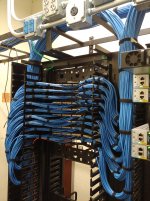 stc_002.jpg560.1 KB · Views: 52
stc_002.jpg560.1 KB · Views: 52 -
 stc_003.JPG590.6 KB · Views: 49
stc_003.JPG590.6 KB · Views: 49 -
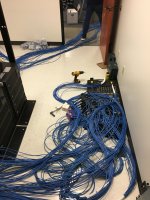 stc_004.JPG598.6 KB · Views: 49
stc_004.JPG598.6 KB · Views: 49 -
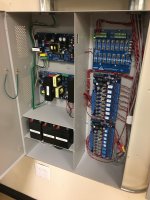 stc_005.JPG439.6 KB · Views: 47
stc_005.JPG439.6 KB · Views: 47 -
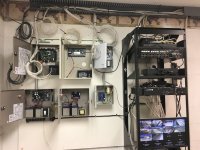 stc_008.JPG528.8 KB · Views: 53
stc_008.JPG528.8 KB · Views: 53 -
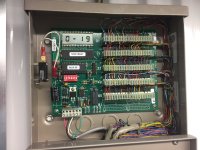 stc_007.JPG353.2 KB · Views: 46
stc_007.JPG353.2 KB · Views: 46 -
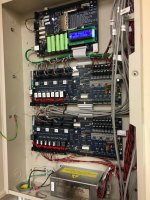 stc_006.JPG573.5 KB · Views: 49
stc_006.JPG573.5 KB · Views: 49 -
 stc_009.JPG589.7 KB · Views: 48
stc_009.JPG589.7 KB · Views: 48 -
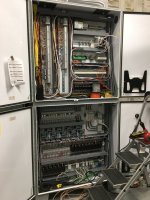 stc_010.JPG537.7 KB · Views: 48
stc_010.JPG537.7 KB · Views: 48 -
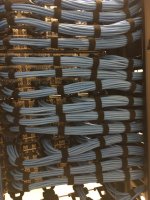 stc_011.jpg85.7 KB · Views: 48
stc_011.jpg85.7 KB · Views: 48 -
 stc_012.jpg126.4 KB · Views: 50
stc_012.jpg126.4 KB · Views: 50
Last edited:
No, I'm not insulting you, just giving you my take on this.
You see, I was doing Internetworking when we called it DARPAnet. Back in the late 80s. In the late 70s I was working with all kinds of machines... no DOS yet. In the early 80s we were burning our own ROM for our Intel PC clones, but for most work we used Motorola chips and HP stuff.
I have the Comer books, the O'Reilly books, etc, etc... and we were writing Internetworking software from the RFC documents, in the very late 80s. Mostly bare metal, a little bit of BSD/HPUX.
Two of us designed our own mark up language with our own browers in '92, to control our routers all over the Internet.. before the guy at CERN released his doc.... You see, our stuff was corporate owned, his was a research paper.
To tell you the truth, the pictures you show me are not that impressive... I'm used to working in labs with tons and TONS of hardware. Lots of it is prototype, because I'm in R&D, see? So, you might want to hold off your comments here, because you might find out that there are people who know a LOT MORE about Internetworking than you. You IT "credentials" don't do it for me because we were writing the books you read.
Oh, btw, I did IOS over at Cisco too. You should have seen that lab we had for just 20 engineers.. a 15,000 foot lab filled of routers, switches, etc... I was doing ATM and DSLAMs then. We took IP to the edge.. the very edge. To the CPE. This was in '99... way ahead of the curve. At that time I was running 802.11b ( in '00), Cable ('00) and ISDN ('04).... All at the same time.
My cable company gave me free service for four years as I set up a DMZ with their modem so they can do loop back testing on their residential Internet service. Using Win NT and 95!
Perhaps I ought to note that my house has 1600 feet of Cat 5e, with three managed switches in a spanning tree configuration, two wireless access points, multiple wired drops in every room, two data closets ( OK, one serves as broom and liquor backups ), routers as gateways...
Anyhow, if you want to talk Internetworking, I am your guy. At home, I'm my own net admin and sys admin. I also maintain my own domain and mail server ( I have them hosted externally for reliability ).... Since '95.
BTW, I'm working on AFDX now... which is sort of like Ethernet meets ATM.
BTWII- you should have seen the labs at WDC and HGST. You wanna see a complex set of networks and corporate level data storage?
R&D is years ahead of the State of the Art. We are today where IT will be in five years.
BTW, Europa Clipper finally launched.... it's got my NAND physical layer firmware.
You see, I was doing Internetworking when we called it DARPAnet. Back in the late 80s. In the late 70s I was working with all kinds of machines... no DOS yet. In the early 80s we were burning our own ROM for our Intel PC clones, but for most work we used Motorola chips and HP stuff.
I have the Comer books, the O'Reilly books, etc, etc... and we were writing Internetworking software from the RFC documents, in the very late 80s. Mostly bare metal, a little bit of BSD/HPUX.
Two of us designed our own mark up language with our own browers in '92, to control our routers all over the Internet.. before the guy at CERN released his doc.... You see, our stuff was corporate owned, his was a research paper.
To tell you the truth, the pictures you show me are not that impressive... I'm used to working in labs with tons and TONS of hardware. Lots of it is prototype, because I'm in R&D, see? So, you might want to hold off your comments here, because you might find out that there are people who know a LOT MORE about Internetworking than you. You IT "credentials" don't do it for me because we were writing the books you read.
Oh, btw, I did IOS over at Cisco too. You should have seen that lab we had for just 20 engineers.. a 15,000 foot lab filled of routers, switches, etc... I was doing ATM and DSLAMs then. We took IP to the edge.. the very edge. To the CPE. This was in '99... way ahead of the curve. At that time I was running 802.11b ( in '00), Cable ('00) and ISDN ('04).... All at the same time.
My cable company gave me free service for four years as I set up a DMZ with their modem so they can do loop back testing on their residential Internet service. Using Win NT and 95!
Perhaps I ought to note that my house has 1600 feet of Cat 5e, with three managed switches in a spanning tree configuration, two wireless access points, multiple wired drops in every room, two data closets ( OK, one serves as broom and liquor backups ), routers as gateways...
Anyhow, if you want to talk Internetworking, I am your guy. At home, I'm my own net admin and sys admin. I also maintain my own domain and mail server ( I have them hosted externally for reliability ).... Since '95.
BTW, I'm working on AFDX now... which is sort of like Ethernet meets ATM.
BTWII- you should have seen the labs at WDC and HGST. You wanna see a complex set of networks and corporate level data storage?
R&D is years ahead of the State of the Art. We are today where IT will be in five years.
BTW, Europa Clipper finally launched.... it's got my NAND physical layer firmware.
Last edited:
When interests covnerge, no conspiracy is needed. As long as no one in the government gets ripped off by privacy invading companies, facebook will keep suggesting you to buy the hifi light bulbs you were talking to your friend about an hour ago.
Or line your pockets with tin foilI got a new product idea. Tabletop 10 GHz-ready Faraday cage, with internal battery powered charging. When you close the main door, the power cord mechanically pops out of the IEC mains connector in back...and a little door closes over it.

Let's just say that I started here in 1975 with a pre release "D2kit":You see, I was doing Internetworking when we called it DARPAnet. Back in the late 80s. In the late 70s I was working with all kinds of machines... no DOS yet. In the early 80s we were burning our own ROM for our Intel PC clones, but for most work we used Motorola chips and HP stuff.
https://en.wikipedia.org/wiki/MEK6800D2
And quickly graduated to one of these:
https://en.wikipedia.org/wiki/SWTPC_6800
One can probably Google up some issues of BYTE magazine of KILOBAUD MICROCOMPUTING to see what the dawn of the "home computer" industry was like.
Working at a Motorola plant since 1972, and fixing a million dollar electron microscope when it was really needed got me lots of favors and free silicon, some of which "never existed." The SWTPC 6800 computer appeared on the market in 1975. By 1977 we had made several clones and modified systems that bore little resemblance to the original. Somewhere in the late 70's a crude DOS for 360 KILOBYTE single sided 5.25 inch floppy drives became available for the SWTPC machine. There was also a real time multi tasking operating system (RTOS) too. It involved swapping out the boot rom (SWTBUG or MIKBUG)) with the RT68MX chip and purchasing a different DOS disk if you used a disk drive. At least one of the early DOS versions was called FLEX, but my old memory gets hazy there.
These were followed my many Apple II clones including the Japple, a knock off with more RAM and other features built on a secret motherboard that came from Japan. TRS-80's were supersized by us. Anyone who ever tinkered with them knows that the first thing that needs to be upgraded is the power supply. The original could barely power a 16 MB machine. Overclocking? Who was crazy enough to solder a socket into a 80386 motherboard where the metal cased chip sized clock oscillator goes and push a 16 MHz Intel 80386 chip to 40 MHz with the heat sink from a mobile radio glued to it? Could it have been the "Big Dumm Blonde One"? Nobody had thought of putting a fan on a CPU chip yet.
Some of the "late light computer club" (we all worked as Mr. Fixits for the huge factory on night shift) did quasi legal things with their DIY computers. I was usually making crude 8 and 12 bit "chiptune" music with mine through a crude memory mapped DAC involving a pair of MC6821 chips and lots of resistors.
Somehow this pair of boards survived my junkbox for 30+ years. They were both 68XXX machines that ran at 10X (board on left) and 40X (board on right with chip that does not exist) the speed of the SWTPC machine with far more memory. Again, making better music and crude "robotic" speech was their intended function.
Attachments
Why do conversations on the internet so easily devolve into sword measuring contests...
I gotta hit the country kitchen buffet for the senior discount. I hope nobody at the restaurant insults my technical prowess, or I might break a hip and have a stroke.
Off I go. If I can find my walker. Where are my glasses?
Where are my keys?
It's Sunday, right?
Nancy, you got my back pills?
I gotta hit the country kitchen buffet for the senior discount. I hope nobody at the restaurant insults my technical prowess, or I might break a hip and have a stroke.
Off I go. If I can find my walker. Where are my glasses?
Where are my keys?
It's Sunday, right?
Nancy, you got my back pills?
Last edited:
I worked on this in the 1980s, as a "qualification engineer" testing multiple units within environmental cycling, to achieve an "SPRT" based reliability measure. An interface that allowed Q-Bus computers on an ethenet. The little gold top SOIC towards the back supposedly cost $1M to develop. Later, some smart fellow turned these into bus interrupt generators by modifying the firmware, to beat the tar out of the interrupt handler of a PDP-11, while it was going through an SPRT reliability qual.

Next thing you know, everyone had their own VAX in their office and could get involved in various "sword measuring contests" with others in the company (of nearly 100K employees) on all sorts of topics using the DEC "Notes" application. "Conferences" included Audio, Music and 1000 other topics. Yes, even "Cats"... "Real Estate"... I remember one fellow's "note" in Music, titled "Is Rap Music?".
All in ASCII on a VT52 or VT100.
Next thing you know, everyone had their own VAX in their office and could get involved in various "sword measuring contests" with others in the company (of nearly 100K employees) on all sorts of topics using the DEC "Notes" application. "Conferences" included Audio, Music and 1000 other topics. Yes, even "Cats"... "Real Estate"... I remember one fellow's "note" in Music, titled "Is Rap Music?".
All in ASCII on a VT52 or VT100.
DECWriters.... remember those?
My senior year in college they gave us at the Math and Physics Dept an LSI machine that we wire wrapped during summer. They did this because someone in the DEC-PDP Assembly Programming Course put a "HALT" instruction rather than the "STOP" macro doing his homework at the last minute. It was the weekend, Friday night, while the cashier's office was running the final report to see who could graduate. ( At private universities they take their money seriously ). Regardless, the school got a VAX too. VMS was a lot easier to program than RSTS-E/11.
Had a couple of internships... DEC, VAX,
I paid my mortgage for many years in the 80s as a consultant developing all kinds of code in HP machines, remember the 1000, 9816, 9836, 3000, etc. Running Motorola chips. Later in the 80s I moved to custom SBCs with the 68000, HP CPU32, etc.. There was an HP office near my house and if they knew you they gave you boxes of books. I must have had like 60 of their books at home. Later I started collecting the Wind River books, which were expensive but the FAEs knew me so they'd give them to me, for free! Even got some from Green Hills.
This last few years and today, the SBC I'm working with is an off the shelf Curtiss Wright with a hybrid multi ARM cores and FPGA architecture. This is where the market going now. With SMP and AMP ( synchronous and asynchronous multiple processing ). I even worked with an Intel board that combined a Xeon with an FPGA. ( I prefer the ARM cores nowadays ).
Yet the Little Endian PCI survives, to create havoc with our brains when we plug in the bus analyzer.
Not so many years ago I was working with devices in custom chips with as many as 40 ARM cores in them (they got more now)... with all kinds of complexity that would have taken a VME chassis back in the day. Look at your smart phone.. the complexity on those chips is astonishing... look at the solid state devices... their controller architectures are flat out incredible. It's not uncommon, when working at a chip maker, to have concurrent projects that have staggered deliveries. You spend your life working with emulators ( Cadence Palladium anyone ). They let you work from home, but it becomes a true 27/7 job as the labs are frightfully expensive to execute and maintain. But imagine being able to put a breakpoint and walk the entire chip backwards! Of course, this usually happens at 3AM... kid you not.
The World has split. The Computer "Scientists" spend their time thinking about logic programs, the "Coders" are technician level writing simple single threaded Python like scripts and simple HTML. Last we have the Computer "Engineers" which are the real time people... what we used to be back in the day.
Only better, I'd say. Today's tools and complexity ( manageable ) would have been considered "magic" just 25 years ago.
I had retired last year, but then I find that I actually love the technical side of what I do and I'm rather good at it. So might as well make some money if I can work from home.
Looking at the simplicity of audio is relaxing. Specially when dealing with people who want to use the simplest possible circuits. No AXI or AHB busses to deal with... no FPGAs to program... Although I regret not having spend enough time with RTL and VHDL. The ability to follow an analog circuit is refreshing. Back to my youth indeed.
IMHO, SMD in DIY audio is the kiss of death... just as I'm getting my chops back in plain old soldering. What next? A home wave soldering machine?
My senior year in college they gave us at the Math and Physics Dept an LSI machine that we wire wrapped during summer. They did this because someone in the DEC-PDP Assembly Programming Course put a "HALT" instruction rather than the "STOP" macro doing his homework at the last minute. It was the weekend, Friday night, while the cashier's office was running the final report to see who could graduate. ( At private universities they take their money seriously ). Regardless, the school got a VAX too. VMS was a lot easier to program than RSTS-E/11.
Had a couple of internships... DEC, VAX,
I paid my mortgage for many years in the 80s as a consultant developing all kinds of code in HP machines, remember the 1000, 9816, 9836, 3000, etc. Running Motorola chips. Later in the 80s I moved to custom SBCs with the 68000, HP CPU32, etc.. There was an HP office near my house and if they knew you they gave you boxes of books. I must have had like 60 of their books at home. Later I started collecting the Wind River books, which were expensive but the FAEs knew me so they'd give them to me, for free! Even got some from Green Hills.
This last few years and today, the SBC I'm working with is an off the shelf Curtiss Wright with a hybrid multi ARM cores and FPGA architecture. This is where the market going now. With SMP and AMP ( synchronous and asynchronous multiple processing ). I even worked with an Intel board that combined a Xeon with an FPGA. ( I prefer the ARM cores nowadays ).
Yet the Little Endian PCI survives, to create havoc with our brains when we plug in the bus analyzer.
Not so many years ago I was working with devices in custom chips with as many as 40 ARM cores in them (they got more now)... with all kinds of complexity that would have taken a VME chassis back in the day. Look at your smart phone.. the complexity on those chips is astonishing... look at the solid state devices... their controller architectures are flat out incredible. It's not uncommon, when working at a chip maker, to have concurrent projects that have staggered deliveries. You spend your life working with emulators ( Cadence Palladium anyone ). They let you work from home, but it becomes a true 27/7 job as the labs are frightfully expensive to execute and maintain. But imagine being able to put a breakpoint and walk the entire chip backwards! Of course, this usually happens at 3AM... kid you not.
The World has split. The Computer "Scientists" spend their time thinking about logic programs, the "Coders" are technician level writing simple single threaded Python like scripts and simple HTML. Last we have the Computer "Engineers" which are the real time people... what we used to be back in the day.
Only better, I'd say. Today's tools and complexity ( manageable ) would have been considered "magic" just 25 years ago.
I had retired last year, but then I find that I actually love the technical side of what I do and I'm rather good at it. So might as well make some money if I can work from home.
Looking at the simplicity of audio is relaxing. Specially when dealing with people who want to use the simplest possible circuits. No AXI or AHB busses to deal with... no FPGAs to program... Although I regret not having spend enough time with RTL and VHDL. The ability to follow an analog circuit is refreshing. Back to my youth indeed.
IMHO, SMD in DIY audio is the kiss of death... just as I'm getting my chops back in plain old soldering. What next? A home wave soldering machine?
When interests covnerge, no conspiracy is needed. As long as no one in the government gets ripped off by privacy invading companies, facebook will keep suggesting you to buy the hifi light bulbs you were talking to your friend about an hour ago.
Well, we're getting political.... but, as it is, the cost of running forums like Facebook, where posts are available to everyone... is incredible.
Facebook and Twitter were a conspiracy indeed.... they implemented post filtering and post tracking. Facebook, and Twitter, could not have existed without the incredible telco and computing resources of the NSA. It allowed government agencies to control and monitor the flow of communication.
NOTE: Elon Musk buying Twitter and freeing it must have been a shock to the system.
Why was this done? The Social Media giants were co-opted very early on by the Western Polities to control the Internet. The inherent freedom of speech of the Internet and its free flow of information presented (still do) a clear and present danger to the State Actors... most of which are interested in preserving and extending their Power, not working for their citizens...
Goebbels
“If you tell a lie big enough and keep repeating it, people will eventually come to believe it. The lie can be maintained only for such time as the State can shield the people from the political, economic and/or military consequences of the lie. It thus becomes vitally important for the State to use all of its powers to repress dissent, for the truth is the mortal enemy of the lie, and thus by extension, the truth is the greatest enemy of the State.”
Solidarity, Poland
When the striking workers went on the streets, they found each other, they talked to each other, they communicated freely with each other. They found out there were way more of them than the Government thugs. At that point, the Communist State was finished. The Truth won over the State's lies.
Facebook, Twitter.
On their surface the modern version of the Romans having games in the Coliseum. But in reality a means to control and monitor the communication of the people. Fundamentally and profoundly political.
Google and Apple. Banks.
Purely economic. I don't think they need the computing resources of Facebook and Twitter since their stuff is about data, not communications. A very different model. At worst, the Gov might want to find out what you bought, but other than that, this is economic. So, in some ways, this more fundamental as the Economic Powers also control the Political Powers....
Last edited:
- Home
- Member Areas
- The Lounge
- Is it Big brother, or Comcast?
